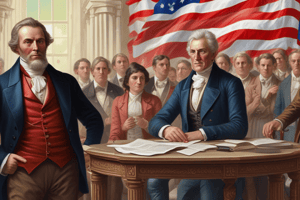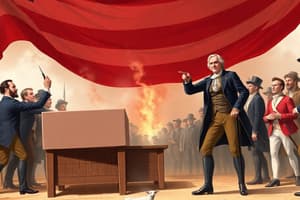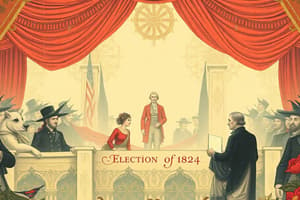Podcast
Questions and Answers
What was the primary accusation Andrew Jackson made regarding the outcome of the 1824 election?
What was the primary accusation Andrew Jackson made regarding the outcome of the 1824 election?
- That William Crawford's health made him an unsuitable candidate.
- That John Quincy Adams lacked the experience to be president.
- That there was a "corrupt bargain" between Adams and Clay. (correct)
- That Henry Clay was not qualified to be Speaker of the House.
What was a key challenge John Quincy Adams faced during his presidency?
What was a key challenge John Quincy Adams faced during his presidency?
- His attempts to dismantle the Bank of the United States.
- His lack of military experience and public speaking skills.
- His support for expanding slavery into new territories.
- His inability to connect with the public and resistance to his infrastructure and education initiatives. (correct)
What distinguished Jackson’s presidential campaign in 1828 from previous elections?
What distinguished Jackson’s presidential campaign in 1828 from previous elections?
- His emphasis on religious tolerance and separation of church and state.
- His support for protective tariffs and industrial development.
- His focus on foreign policy and international trade.
- His appeal to popular rule and attacks on his opponent's character. (correct)
What action is most associated with Jackson's implementation of the spoils system?
What action is most associated with Jackson's implementation of the spoils system?
The Tariff of 1828 was known as the Tariff of Abominations because it:
The Tariff of 1828 was known as the Tariff of Abominations because it:
What was the main argument presented in John Calhoun's "South Carolina Exposition"?
What was the main argument presented in John Calhoun's "South Carolina Exposition"?
What was the primary goal of the Indian Removal Act during Jackson's presidency?
What was the primary goal of the Indian Removal Act during Jackson's presidency?
Why did Andrew Jackson oppose the Bank of the United States?
Why did Andrew Jackson oppose the Bank of the United States?
What was the main consequence of Jackson’s actions against the Bank of the United States?
What was the main consequence of Jackson’s actions against the Bank of the United States?
Opposition to Andrew Jackson's policies and leadership style led to which significant political development?
Opposition to Andrew Jackson's policies and leadership style led to which significant political development?
What was a major factor contributing to Martin Van Buren's defeat in the Election of 1840?
What was a major factor contributing to Martin Van Buren's defeat in the Election of 1840?
Why did Jackson hesitate to recognize Texas independence?
Why did Jackson hesitate to recognize Texas independence?
What was a defining characteristic of the era of New Democracy?
What was a defining characteristic of the era of New Democracy?
How did Jackson's actions during the Nullification Crisis impact the relationship between the federal government and states?
How did Jackson's actions during the Nullification Crisis impact the relationship between the federal government and states?
How did the collapse of Biddle's Bank affect the Western territories of the United States?
How did the collapse of Biddle's Bank affect the Western territories of the United States?
Flashcards
"Corrupt Bargain"
"Corrupt Bargain"
Alleged deal where Henry Clay supported John Quincy Adams for president in exchange for becoming Secretary of State.
Spoils System
Spoils System
Rewarding political supporters with government jobs.
Tariff of Abominations
Tariff of Abominations
High tariff passed in 1828 that angered Southerners.
Trail of Tears
Trail of Tears
Signup and view all the flashcards
Bank War
Bank War
Signup and view all the flashcards
Whig Party
Whig Party
Signup and view all the flashcards
Panic of 1837
Panic of 1837
Signup and view all the flashcards
New Democracy
New Democracy
Signup and view all the flashcards
Old Hickory
Old Hickory
Signup and view all the flashcards
Nullification
Nullification
Signup and view all the flashcards
Indian Removal Act
Indian Removal Act
Signup and view all the flashcards
Individual Liberty
Individual Liberty
Signup and view all the flashcards
States' Rights
States' Rights
Signup and view all the flashcards
Nationalism
Nationalism
Signup and view all the flashcards
Economic Development
Economic Development
Signup and view all the flashcards
Study Notes
- The election of 1824 included Andrew Jackson, Henry Clay, William H. Crawford, and John Quincy Adams, all Republicans.
- Jackson received the most popular and electoral votes but not a majority.
- The 12th Amendment dictated that the House of Representatives would vote on the top three candidates.
- As Speaker of the House, Clay influenced the election's outcome.
- Clay supported Adams after Crawford's stroke, resulting in Adams becoming president.
- Jackson alleged a "corrupt bargain" between Clay and Adams but no evidence was discovered.
John Quincy Adams' Presidency
- Adams was known for his strong principles rather than for being popular.
- He struggled to connect with the public and removed few officeholders.
- His administration prioritized infrastructure and education.
- Southerners resisted due to concerns about tax increases.
Jackson's Campaign and Victory in 1828
- Jackson campaigned on popular rule, claiming Adams and Clay had cheated the people.
- Despite Adams' good reputation, Jackson's supporters attacked him personally.
- Jackson won decisively, signaling a shift in presidential support.
Andrew Jackson's Character
- Jackson had health issues when he became president.
- He embodied the rugged individualism of the West.
- Jackson was a judge, congressman, and a man of the people.
- He held prejudices and owned slaves.
- He strongly believed in federal power and was willing to defy the Supreme Court.
The Spoils System
- Jackson implemented the spoils system to reward loyal supporters with government jobs.
- He wanted to refresh the government but only replaced a small number of positions initially.
- The system became entrenched and led to corruption.
- Samuel Swartwout's embezzlement exemplified the corruption.
Tariff of Abominations and Nullification
- The Tariff of 1828 raised duties, angering Southerners.
- Southerners felt it unfairly taxed their products.
- John Calhoun's "South Carolina Exposition" denounced the tariff and called for nullification.
- South Carolina couldn't achieve the two-thirds majority needed to nullify the tariff.
- The Tariff of 1832 lowered rates but Southern opposition remained.
- A compromise by Henry Clay eventually resolved the crisis.
Trail of Tears
- Federal policy aimed to acquire Native American lands through treaties, often deceitfully.
- The Cherokee tried to assimilate but were removed under the Indian Removal Act.
- Thousands died during the forced relocation known as the Trail of Tears.
Bank War
- Jackson distrusted the Bank of the United States, seeing it as a tool for the wealthy.
- He vetoed its re-charter, stating that it was unconstitutional.
- This intensified the divide between the West and East.
- The Bank eventually collapsed.
Election of 1832
- The first party conventions were held.
- Jackson ran as a Democrat against Clay and others.
- Jackson won decisively.
Demise of the Bank
- Jackson withdrew funds from the Bank of the US to weaken it.
- This led to a financial panic.
- The Bank's collapse caused economic hardship for the West, which had relied on it.
Two-Party System
- Opposition to Jackson led to the formation of the Whig Party.
- Democrats advocated individual liberty and states' rights.
- Whigs favored national harmony and economic development.
Election of 1836
- Jackson endorsed Martin Van Buren as his successor.
- The Whig Party was disorganized and failed to unite.
- Van Buren won the election.
Martin Van Buren's Challenges
- Van Buren faced challenges including a rebellion in Canada and an economic depression stemming from the Bank War.
- The Panic of 1837 led to widespread bank failures.
- His rejection of Whig proposals for economic recovery led to further discontent.
Texas Independence
- Settlers in Texas, led by figures like Sam Houston, resisted Mexican authority.
- Texas declared independence.
- Jackson hesitated to recognize Texas due to the slavery issue.
Election of 1840
- The Whigs nominated William Henry Harrison.
- Harrison won the election, marking a protest against Van Buren's economic hardships.
New Democracy
- The era of New Democracy emphasized universal white male suffrage.
- Politicians needed to appeal to the masses.
- Jacksonian democracy promoted the idea that governance should be by the people.
- Reflecting a shift in American political culture
Studying That Suits You
Use AI to generate personalized quizzes and flashcards to suit your learning preferences.




